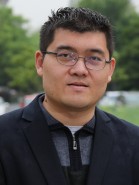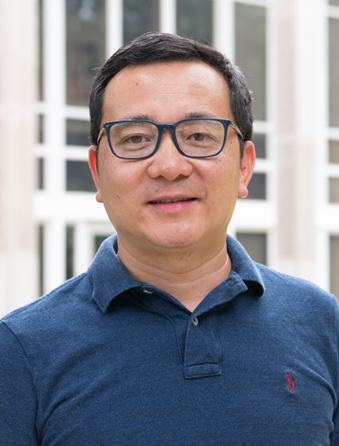ICCDA 2025 Keynote Speakers

Prof. Chun-Yi Su
Concordia University, Canada
H-index: 83
苏春翌,加拿大康考迪亚大学,教授
Chun-Yi Su (Senior Member, IEEE) received the Ph.D. degree in control engineering from the South China University of Technology, Guangzhou, China, in 1990.,After a seven-year stint with the University of Victoria, Victoria, BC, Canada, he joined Concordia University, Montreal, QC, Canada, in 1998, where he is currently a Professor of Mechanical and Industrial Engineering and holds the Concordia University Research Chair in Control. He is currently a Professor with the State Laboratory of Synthesis Automation of Process Industry, Northeastern University, Shenyang, China. He has also held several short-time visiting positions, including the Chang Jiang Chair Professorship by the China Ministry of Education and the JSPS Invitation Fellowship from Japan. He is the author or a co-author of over 300 publications, which have appeared in journals, as book chapters, and in conference proceedings. His research covers control theory and its applications to various mechanical systems, with a recent focus on control of systems involving hysteresis nonlinearities.,Dr. Su has served for many conferences as an organizing committee member. He has been on the editorial board of 18 journals, including Mechatronics (IFAC). He has served as an Associate Editor for the IEEE Transactions on Automatic Control and IEEE Transactions on Control Systems Technology.

Prof. Dave Towey
University of Nottingham Ningbo China
Speech Title: Testing Untestable Software, and Teaching How: Metamorphic Testing
Professor Dave Towey received the BA and MA degrees in computer science, linguistics, and languages from the University of Dublin, Trinity College, Ireland; the MEd degree in education leadership from the University of Bristol, U.K.; and the PhD degree in computer science from The University of Hong Kong, Hong Kong S.A.R., China. He has been with University of Nottingham Ningbo China (UNNC) since 2013, where he serves as the head of the School of Computer Science, and as deputy director of the International Doctoral Innovation Centre. He previously served as the associate dean of education and student experience for the Faculty of Science and Engineering. Prior to joining UNNC, he spent eight years working in a variety of roles with another Sino-foreign university in Zhuhai (Beijing Normal University-Hong Kong Baptist University: United International College, UIC ... recently renamed to Beijing Normal Baptist University, BNBU). His current research interests include software testing (especially adaptive random testing, for which he was amongst the earliest researchers who established the field, and metamorphic testing) and technology-enhanced education. He co-founded the ICSE International Workshop on Metamorphic Testing in 2016. He is a fellow of the HEA, and a senior member of the ACM and IEEE.

Prof. Tao Liu
Southwest Minzu University
Speech Title: Intelligent Reflecting Surface-Assisted IoT Charging Strategies in 5G/6G Networks
Tao Liu, Ph.D. (Postdoctoral), is a professor and master's supervisor. He is recognized as a leading talent by the National Civil Affairs Commission and a reserve candidate for academic and technological leadership in Sichuan Province. Dr. Liu has served as a visiting scholar at Columbia University in the United States and Ludwig Maximilian University of Munich in Germany. Dr. Liu has been engaged in long-term research in areas including the Internet of Things, edge computing, artificial intelligence, smart communications, smart agriculture, and smart transportation. In recent years, he has led over more than 10 research projects at various levels, including the National Natural Science Foundation of China General Project, the China Postdoctoral Science Foundation’s General Fund, Sichuan Province’s science and technology projects, and research projects supported by the State Ethnic Affairs Commission. Dr. Liu has published over 40 academic papers in prestigious international journals, such as IEEE Transactions on Mobile Computing, IEEE Transactions on Wireless Communications, IEEE Transactions on Communications, IEEE Internet of Things Journal, and IEEE Transactions on Intelligent Transportation Systems.
ICCDA 2024 Keynote Speakers

Prof. Xi Li
Zhejiang University, China
IAPR/IET Fellow
李玺 教授,浙江大学
Speech Title: Multimodal Visual Structure Learning
Xi Li is a QIushi distinguished professor of Zhejiang University, a National Outstanding Young Scholar, an IAPR/IET Fellow, an IEEE Senior Member, a CCF Distinguished Member, one of the top 2% scientists in the world, a 2023 "Chinese Highly Cited Scholar" by Elsevier, and a National Youth Distinguished Expert. He is engaged in research in the field of artificial intelligence, has published more than 200 high-quality academic papers, and has won four best academic paper awards. His achievements have been applied to companies such as Huawei, Alibaba, and Hikvision.
李玺,浙江大学求是特聘教授,国家杰青,IAPR/IET Fellow,IEEE Senior Member,CCF杰出会员,全球前2%顶尖科学家,Elsevier 2023“中国高被引学者”,国家青年特聘专家。从事人工智能领域研究,发表高水平学术论文200余篇,获得四项最佳学术论文奖。成果应用于华为、阿里、海康等企业。

Shaoen Wu
Kennesaw State University, USA
伍绍恩 教授,美国肯尼索州立大学
Speech Title: Security in the Rising of AI
Dr. Shaoen Wu is the Department Chair and a full professor of Information Technology at Kennesaw State University. He also serves as a Steering Committee Chair of IEEE MMTC. Dr. Wu worked as the State Farm Endowed Chair Professor in the School of Information Technology at Illinois State University, served on the Advisory Council of Scholarship for the Vice Provost for Research, the Dean's Faculty Advisory Board, and the Assistant Department Chair of Computer Science at Ball State University, also worked as an assistant professor in the School of Computing at the University of Southern Mississippi, a Staff Scientist at ADTRAN, and a Member of Technical Staff at Bell Labs, Lucent Technologies. He has been a General or TPC Chair for several international conferences, including the CSM of Globecom 2021. Dr. Wu has directed research projects of several million dollars funded by US federal agencies and industry.

Ruili Wang
Wenzhou University of Technology, China
王睿利 教授,温州理工学院,新西兰工程院院士
Speech Title: AI + Healthcare + Rehabilitation
Prof Ruili Wang received the Ph.D. degree in Computer Science from Dublin City University, Dublin, Ireland. His research interests include speed processing, language processing, image processing, data mining, intelligent systems, and complex systems. Prof. Wang serves as an Associate Editor and a member of the editorial boards of five international journals such as Knowledge and Intelligent Systems (Springer), Health Information Science and Systems (Springer), Applied Soft Computing (Elsevier), and Complex and Intelligent Systems (Springer). He has received prestigious research grants in New Zealand such as the Marsden Fund (2013-2017), NSC Science for Innovation Seed Project Fund (2017). MBIE Catalyst Strategic Fund (2020-2025). Prof Wang has supervised 30 PhD students to completion.
Michael John Witbrock
The University of Auckland, New Zealand
Michael John Witbrock 教授,新西兰奥克兰大学
Speech Title: Generalising Minds: Animals, AI, Organisations and the Nature of Intelligence
Prof. Michael John Witbrock is a computer science professor at The University of Auckland, New Zealand, directing the Strong AI Lab (SAIL) and the Natural, Artificial, and Organisational Intelligence Institute (NAOI). He earned a PhD in Computer Science from Carnegie Mellon University and a BSc (Hons) in Physiological Psychology from the University of Otago. His career includes roles such as Science Director at Precision Driven Health (NZ) and leading the “Learning to Reason” AI at IBM’s Thomas J. Watson Research Centre in the USA.
His research at SAIL merges machine learning, reasoning, and natural language understanding to enhance AI's societal benefits both locally and worldwide. Current projects include developing adaptive quasi-logical systems, constructing deep learning frameworks for robust knowledge bases, applying AI agent systems to scientific research and studying ethical behaviours in animals to guide responsible AI integration into society.
Prof. Witbrock is an active member of the AI Forum NZ and chairs the AI for Good Foundation. He has authored and co-authored numerous publications in deep learning and general AI, and holds several patents, reflecting his interests in reasoning, learning, computational linguistics and general AI. Additionally, as an entrepreneur and investor, he supports innovative ventures in AI and social good, demonstrating a commitment to the positive evolution of technology in society.